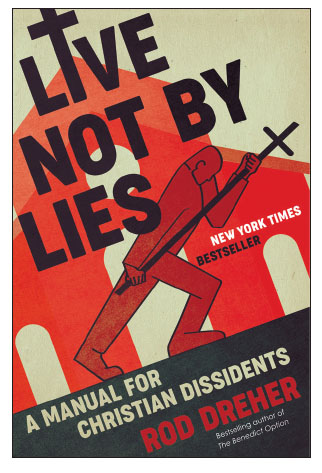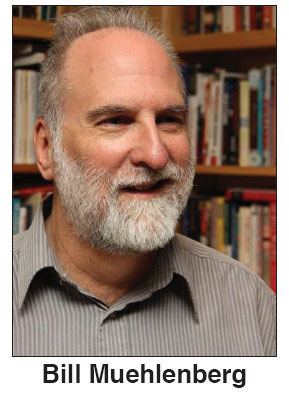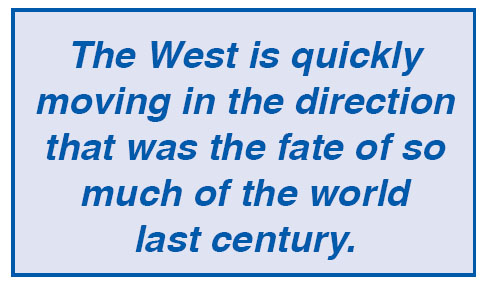Bracing for the coming persecution
Book Review by Bill MuehlenbergLive Not by Lies: A Manual for Christian Dissidents, by Rod Dreher (New York: Sentinel, 2020). Hardcover: 256 pages. ISBN: 978-0593087398.
 "Open war is upon you whether you would risk it or not."
"Open war is upon you whether you would risk it or not."
Some of you may recall that line of Aragorn to King Théoden of Rohan in Tolkien's The Two Towers. And it is now fully applicable to what Christians find in the West today. As genuine persecution begins to mount, only real deal Christians will be able to stand and withstand – not the fake ones. The time of playing games is over. The time of a cross-less Christianity is long gone.
 That is one of the main takeaways from this important new
volume by Rod Dreher. The American Christian writer and
commentator especially came into prominence back in 2017
with the release of his widely discussed book, The Benedict
Option: A Strategy for Christians in a Post-Christian Nation.
That is one of the main takeaways from this important new
volume by Rod Dreher. The American Christian writer and
commentator especially came into prominence back in 2017
with the release of his widely discussed book, The Benedict
Option: A Strategy for Christians in a Post-Christian Nation.
In it he said – among other things – that taking a tactical and temporary timeout from the culture wars might be a wise thing to do. (See my discussion of that book in CultureWatch, June 11, 2017).
His new book is also getting a lot of attention. The title may seem strange, until one understands that it comes from an essay by Solzhenitsyn, the last one he wrote before being evicted from the Soviet Union. In the piece he told the Russian people that totalitarianism is built on lies and the people's fear. The way to defeat it is to not live by lies.
The importance of Solzhenitsyn and others who have lived under totalitarian regimes is they know how it works. They have been there and done that. Some of their stories are recounted here. And these brave souls who are now living in the West are utterly shocked at how clueless Westerners are as they follow the same path to totalitarianism – although via new means.
And the two main means by which this is happening today is by so-called social justice, where group identity trumps the individual, and by technological surveillance. As to the former, the West is of course awash in identity politics.
Says Dreher: "It encourages people to identify with groups – ethnic, sexual, and otherwise – and to think of Good and Evil as a matter of power dynamics among these groups. A utopian vision drives these progressives, one that compels them to seek to rewrite history and reinvent language to reflect their ideals of social justice.
 "Further, these utopian progressives are constantly changing
the standards of thought, speech, and behavior.... Under the
guise of 'diversity', 'inclusivity', 'equity', and other egalitarian
jargon, the Left creates powerful mechanisms for controlling
thought and discourse and marginalizes dissenters as evil."
"Further, these utopian progressives are constantly changing
the standards of thought, speech, and behavior.... Under the
guise of 'diversity', 'inclusivity', 'equity', and other egalitarian
jargon, the Left creates powerful mechanisms for controlling
thought and discourse and marginalizes dissenters as evil."
That of course ties in with the latter. Dreher looks at how technology and totalitarianism combine to create Big Brother statism. The Chinese social credit system is a clear case in point: it "automatically tracks the words and actions, online and off, of every Chinese citizen, and grants rewards or demerits based on obedience". Doing what the State approves of will get you a higher social credit score, while doing what it frowns upon will result in a downgrade.
Dreher asks if it can happen here: "Of course it can. The technological capability to implement such a system of discipline and control in the West already exists." Simply think how states have run with corona this year: surveillance and compliance are at an all-time high. One can barely check into a shop or a restaurant, for example, without signing in, or using your smartphone QR code to get access to goods and services.
As one recent headline put it, "The QR code has turned COVID-19 check-ins into a golden opportunity for marketing and data companies." Crony capitalism – the wedding of Big Business and Big Government – will ensure this data does NOT remain private. And, of course, all the talk of vaccine passports and the like is no longer the stuff of conspiracy theories.
All this is frightening stuff indeed.
Dreher writes: "In the West today, we are living under decadent, pre-totalitarian conditions. Social atomization, widespread loneliness, the rise of ideology, widespread loss of faith in institutions, and other factors leave society vulnerable to the totalitarian temptation to which both Russia and Germany succumbed in the previous century."
He reminds us that it was the supporters of Mussolini who first used the term totalitarianism with this meaning: "Everything within the state, nothing outside the state, nothing against the state." Dreher says we are heading there: "Hard totalitarianism depends on terrorizing us into surrendering our free consciences; soft totalitarianism uses fear as well, but mostly it bewitches us with therapeutic promises of entertainment, pleasure, and comfort." But the end result will be just the same.
This book is far from mere theorising. As mentioned, it is filled with sobering and sorrowful stories of those who know what such persecution is all about. Those who managed to survive their own anti-Christian hell and were able to make it to America are now amazed that what they are witnessing in the U.S. is so reminiscent of what they already went through.
Yes, we may be in the early stages of this yet, but all the more reason to heed the warnings and respond quickly as the alarm is being sounded. This book is a clarion call to wake up, heed the signs, and do what we can to prevent a new statist darkness and cultural barbarism from fully descending upon America and the West.
As one Eastern European said: "With our eyes fixed intently on the West, we could see how it was beginning to experience the same things we knew from the time of totalitarianism. Once again, we are being told that Christian values stand in the way of people having a better life. History has already shown us how far this kind of thing can go. We also know what to do now in terms of making life decisions."
Their stories alone are worth the price of the book. There are so many moving tales to choose from here, but let me offer just a few. A Czechoslovakian Jesuit priest could see early on that the church would be no match for Communism. He began discipling others on how to survive the coming onslaught, and even how to withstand interrogation.
Says Dreher: "In 1946, Czech authorities deported the activist priest. Two years later, communists seized total power, just as Father Kolakovic had predicted. Within several years, almost all of the Family had been imprisoned and the Czechoslovak institutional church brutalized into submission.
"But when the Family members emerged from prison in the 1960s, they began to do as their spiritual father had taught them. Father Kolakovic's top two lieutenants – physician Silvester Kreméry and priest Vladimír Jukl – quietly set up Christian circles around the country and began to build the underground church.
"The underground church, led by the visionary cleric's spiritual children and grandchildren, became the principle means of anti-communist dissent for the next forty years."
Another story: One Polish Christian who lived under the twin totalitarianisms of Nazism and Marxism said that both sought to destroy the church and the family. As to the latter: "Communism attempted to break apart the family by maintaining a monopoly on education and teaching young people to be dependent on the state. It also sought to lure the young away from the church by convincing them that the state would be the guarantors of their sexual freedom." Hmm, sound familiar?
And a final, more gruesome, story about Soviet dissident Alexander Ogorodnikov. Although born into a Communist family, he converted to Christianity while young and was put on death row in a notorious prison.
He told the others there: "Listen brothers, I was sent here to help you meet death, not as criminals but as men with souls that are going to meet their makers, to go meet God the Father. Given that they always took people to go be shot really early in the morning, many of them didn't sleep. They were waiting for the knock at the door to see who would be called out. So, of course they didn't sleep. Neither did I. I helped them turn this night of terror into a night of hope."
 He was then put in solitary confinement with a single guard,
who told him this: "When I was a young guard in a different
prison, they would gather twenty or thirty priests who had been
behind bars, and took them outside. They rigged them up to a
sled, so that they were pulling the sled. They had them pull the
sled out into the forest. They made them run all day, until they
brought them to a swamp. And then they put them into two rows,
one behind the other. I was one of the guards who stood in the
perimeter around the prisoners.
He was then put in solitary confinement with a single guard,
who told him this: "When I was a young guard in a different
prison, they would gather twenty or thirty priests who had been
behind bars, and took them outside. They rigged them up to a
sled, so that they were pulling the sled. They had them pull the
sled out into the forest. They made them run all day, until they
brought them to a swamp. And then they put them into two rows,
one behind the other. I was one of the guards who stood in the
perimeter around the prisoners.
"One of the KGB guys walked up to the first priest. He asked him very calmly and quietly, 'Is there a God?' The priest said yes. They shot him in the forehead in such a way that his brains covered the priest standing behind him. He calmly loaded his pistol, went to next priest, and asked, 'Does God exist?'
"'Yes, he exists.' The KGB man shot this priest in the same way. We didn't blindfold them. They saw everything that was about to happen to them."
Dreher then says this: "Ogorodnikov fights back tears as he comes to the end of his story. In a voice cracking with emotion, the old prisoner says, 'Not one of those priests denied Christ'."
These and other stories are the real meat of the book, and they serve their purpose: to warn us what lies ahead, if we do not wake up and start to turn things around. Christianity has always been in the sights of the secular left, and the West is quickly moving in the direction that was the fate of so much of the world last century.
As Dreher says, "The kind of Christians we will be in the time of testing depends on the kind of Christians we are today. And we cannot become the kind of Christians we need to be in preparation for persecution if we don't know stories like this, and take them into our hearts."
Dreher performs an invaluable service here as a watchman on the wall, alerting us to these coming dangers. How we respond to these warnings may well determine the fate of the West.
Bill Muehlenberg is an American-born Christian apologist,
ethicist and cultural commentator, who lives in Melbourne.
The above book review is reprinted, with his permission,
from his website, CultureWatch, at: BillMuehlenberg.com
![]()
